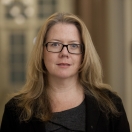
The winners of the first ever Google Science Fair met with President Obama in the Oval Office this week. The competition for the titles was fierce, with entries from more than 10,000 students from 91 countries submitted via the web. That the winners were smart and creative scholars came as no surprise to anyone. What went against conventional wisdom however, was that all three of the winners were young women from the United States, which made the win even more exciting for Naomi Shaw, 16. "It’s really great to see that the tides are shifting and women are entering the science field and the technology field. And I’m really glad to be a part of that. I hope to create a group of mentors that people kind of are aware of this field in science and technology and they’re interested in it at a younger age."
Shree Bose from Fort Worth, Texas was both the grand prize winner and named best in the 17-18 category, and was honored for her research on improving ovarian cancer treatment for people who have built up resistance to a common type of chemotherapy drugs, work she completed as a junior in high school. Shaw of Portland, Oregon, won the 15-16 category for her study on the effects of air quality on lungs, with a focus on people with asthma, and Lauren Hodge of Dallastown, Pennsylvania won the age 13-14 category for research on whether marinades reduce the amount of cancer-causing compounds produced by grilling meat. She found that lemon juice and brown sugar cut the level of carcinogens sharply.
Hodge said the reactions from her classmates surprised her. "It was funny because you come back and it’s like “how was the science fair” and it’s like, 'I won my age group.' And they were like 'that’s so cool.' It was just neat because it wasn’t just, 'oh, it’s just science, ew.' I mean, they were excited about it."
Bose says she would not have come this far without her parents -- and the benefits of an American education. "Throughout my entire life, I have grown up with my parents telling me that America is the land of opportunity. And honestly at this point, I can finally say I’ve experienced that firsthand. Because this Google Global Science Fair took students from 91 countries and we were all competing against each other. But all three winners were not only women, but they were American women. It just goes to show you the things we have access to—like Internet, and professors willing to open up their labs for high school students. Those are opportunities—in America."
Making sure opportunities to excel in math, science and engineering exist for girls and young women is a priority for the President and First Lady, who spoke about the importance of supporting women in these fields at a recent event:
It’s about showing every child that a scientist isn’t just something you hear about in biology class, that a doctor isn’t someone you visit when you’re sick. Instead, young people -- particularly our girls -- need to understand that doctors and scientists are something that anyone can become, no matter how much money your family has, no matter where you come from or whether you’re a man or a woman. And that message is more important than ever in today’s world.
As my husband has said again and again, in order to meet the challenges of the next century, we have got to strengthen our role as the world’s engine of scientific discovery and technological advancement. We need to educate the scientists who will make the next big discoveries that will fuel our economy. We need the highly skilled leaders who can teach in our classrooms, run our laboratories, and power our industries for decades to come.
And if we’re going to out-innovate and out-educate the rest of the world, then we have to open doors to everyone. We can't afford to leave anyone out. We need all hands on deck. And that means clearing hurdles for women and girls as they navigate careers in science, technology, engineering and math.


